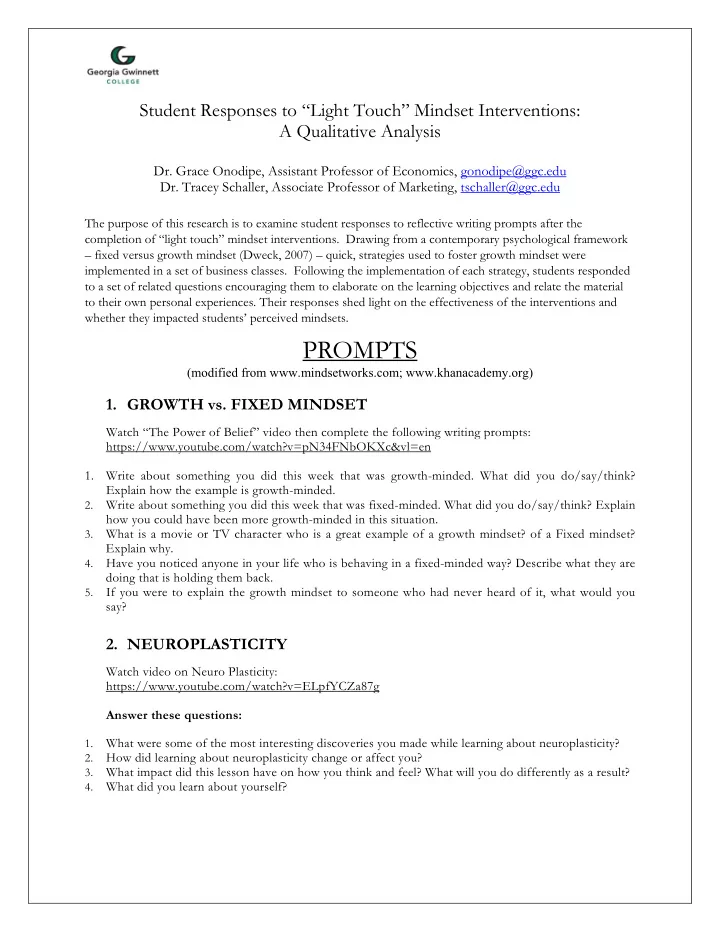

Student Responses to “Light Touch” Mindset Interventions: A Qualitative Analysis Dr. Grace Onodipe, Assistant Professor of Economics, gonodipe@ggc.edu Dr. Tracey Schaller, Associate Professor of Marketing, tschaller@ggc.edu The purpose of this research is to examine student responses to reflective writing prompts after the completion of “light touch” mindset interventions. Drawing from a contemporary psychological framework – fixed versus growth mindset (Dweck, 2007) – quick, strategies used to foster growth mindset were implemented in a set of business classes. Following the implementation of each strategy, students responded to a set of related questions encouraging them to elaborate on the learning objectives and relate the material to their own personal experiences. Their responses shed light on the effectiveness of the interventions and whether they impacted students’ perceived mindsets. PROMPTS (modified from www.mindsetworks.com; www.khanacademy.org) 1. GROWTH vs. FIXED MINDSET Watch “The Power of Belief” video then complete the following writing prompts: https://www.youtube.com/watch?v=pN34FNbOKXc&vl=en 1. Write about something you did this week that was growth-minded. What did you do/say/think? Explain how the example is growth-minded. 2. Write about something you did this week that was fixed-minded. What did you do/say/think? Explain how you could have been more growth-minded in this situation. 3. What is a movie or TV character who is a great example of a growth mindset? of a Fixed mindset? Explain why. 4. Have you noticed anyone in your life who is behaving in a fixed-minded way? Describe what they are doing that is holding them back. 5. If you were to explain the growth mindset to someone who had never heard of it, what would you say? 2. NEUROPLASTICITY Watch video on Neuro Plasticity: https://www.youtube.com/watch?v=ELpfYCZa87g Answer these questions: 1. What were some of the most interesting discoveries you made while learning about neuroplasticity? 2. How did learning about neuroplasticity change or affect you? 3. What impact did this lesson have on how you think and feel? What will you do differently as a result? 4. What did you learn about yourself?
3. FAMOUS FAILURES Watch Famous Failures video: https://www.youtube.com/watch?v=zLYECIjmnQs&t=11s 1. Think about a mistake or failure you experienced. What was the learning that came from that experience? 2. In your opinion, do we learn more from our successes or our failures? 3. How do you feel about mistakes and failure – do you tend to avoid or embrace them? 4. Fill in the blank: "When I make a mistake I feel _____________." "Even thinking about failing makes me ___________." 5. What was the most interesting or important thing you learned from the "Famous Failures" video/handout? 6. How could you use or apply what you learned from the "Famous Failures" video/handout in your approach to school generally and this class in particular? 4. SELF-TALK Self-talk is the constant stream of conversation you have with yourself. It includes the statements you say to yourself like "I'm really good at sports" or "I'm just bad at Math." Self-talk can have a huge influence on your self-esteem and confidence. There is positive and negative self-talk and they both have an impact on how you feel and how you think. Learning to control your self-talk can help you develop a growth mindset. For each of the fixed mindset, self-talk statements below, write a new, helpful statement that will support a growth-mindset perspective. The first few are done for you as examples. Instead of saying .... I can say .... I'm not good at this. I'm going to train myself to do this. I will never do it like they do. What can I learn from them? I'm awesome at this. I've worked hard to learn this. This is too hard. I'm not good at statistics/math/economics. I'm not going to ask questions in class because I don't want to look dumb. They are all just naturally good at this. I don't know why I don't get it. There is no point putting in all of this time and effort. I am so lost, I have no idea what to say. My answer is fine the way it is. 5. PERSONAL STORIES Watch the following video featuring John Legend: https://www.youtube.com/watch?v=LUtcigWSBsw 1. Reflect on a struggle you have had in this class or another one of your classes. How did it make you feel? 2. How did you overcome your struggle? What did this challenge teach you? 3.
References 1. Dweck, C. S. (2007). Mindset: The new psychology of success . Random House Digital, Inc. 2. Paunesku, D., Walton, G. M., Romero, C., Smith, E. N., Yeager, D. S., & Dweck, C. S. (2015). Mind-set interventions are a scalable treatment for academic underachievement. Psychological science , 26 (6), 784-793. 3. Yeager, D. S., & Dweck, C. S. (2012). Mindsets that promote resilience: When students believe that personal characteristics can be developed. Educational psychologist , 47 (4), 302-314. 4. Yeager, D. S., & Walton, G. M. (2011). Social-psychological interventions in education: They’re not magic. Review of educational Research , 81 (2), 267-301.
Recommend
More recommend